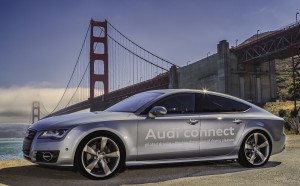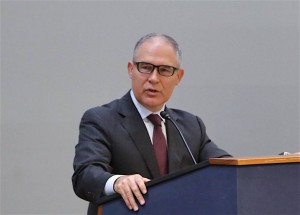The Trump Administration’s choice to head the U.S. Environmental Protection Agency highlighted the stark difference between his expected approach to issues involving automakers, if confirmed, and those of previous administrations during his Senate confirmation testimony.
Scott Pruitt, the former oil industry lawyer and Oklahoma Attorney General, who is President-elect Donald Trump’s choice to head the EPA, told a Senate committee he was a fervent believer in a “states’ rights” approach to environmental regulation and controls.
However, at the same time Pruitt said that he planned to review the State of California’s right to set its own air quality regulations.
Pruitt said during a hearing that he cannot commit to keeping in place the current version of a decades-old federal waiver that allows California to set emissions standards stricter than elsewhere in the United States, according to The Los Angeles Times.
(Trump nominates Oklahoma AG Pruitt to head EPA. Click Here for the story.)
Pruitt suggested he had doubts about allowing California to continue to have the power to impose its own emission rules for cars and trucks, an authority the state has enjoyed for decades that is also the cornerstone of its efforts to fight global warming.

California's had a waiver in the Clean Air Act to set its own emissions requirements to protect the Los Angeles Basin from smog.
The waiver was written into the original federal Clean Air Act because of the state’s fears that federal regulation could not force carmakers to clean up air pollution in the Los Angeles Basin. Thirteen other states in the Northeast and on the West Coast have often followed California’s lead.
Carmakers have battled with California about the waiver for years and tested it in court unsuccessfully.
The National Automobile Dealers Association has said it plans to review the Obama administration’s fuel-economy requirements. But Pruitt’s comments suggest he wants to go even further.
However, the auto industry, while encouraging a review of the Obama rules, might be an uncertain ally in a full-fledged battle with California about emission rules in the age on social media where any brand siding the with Trump’s militant anti-regulation agenda could face a potentially harsh backlash in the nation’s most lucrative market for new vehicles.
California regulators have used the waiver to force automakers to build more efficient vehicles, which has helped the state cut its greenhouse gas emissions from cars and trucks by nearly a third since 2009, the LA Times noted.
Pruitt said that EPA overreached under Obama, adding that as Oklahoma’s attorney general, he had seen “examples where the agency became dissatisfied with the tools Congress had given it to address certain issues, and bootstrapped its own powers and tools through rule-making.”
(Click Here for details Trump’s tariff threats to Canada and Germany.)
Democrats on the Senate Environment and Public Works Committee defended actions by the EPA by showing Pruitt letters drafted by energy lobbyists that were sent on the official stationary of the State of California to federal agencies and even to the President, claiming economic hardship threatened by regulations.
Pruitt was introduced by Senator James Inhofe, another Oklahoma Republican, who is Congress’s most prominent member in rejecting the established science of human-caused climate change.
Inhofe praised Pruitt as a “champion of state and individual rights” who had “fought against federal overreach.”
“Yes, as attorney general, Scott fought the EPA, the Fish and Wildlife Service and the outgoing administration on many fronts, but all of these suits were brought to protect state and local interests from overzealous and activist agencies,” Inhofe said.
Pruitt also addressed climate change directly in his opening remarks, saying: “Science tells us that the climate is changing and human activity in some manner impacts that change. The human ability to measure with precision the extent of that impact is subject to continuing debate and dialogue, as well they should be.”
Pruitt’s testimony came as scientist’s working for the federal government reported that the earth’s surface temperature had climbed to a record level for third consecutive year in 2016. Earth’s 2016 surface temperatures were the warmest since modern recordkeeping began in 1880, according to independent analyses by NASA and the National Oceanic and Atmospheric Administration.
(NADA Chief implores Trump to undo Obama auto rules. Click Here for the story.)
Globally averaged temperatures in 2016 were 1.78 degrees Fahrenheit (0.99 degrees Celsius) warmer than the mid-20th century mean. This makes 2016 the third year in a row to set a new record for global average surface temperatures.

